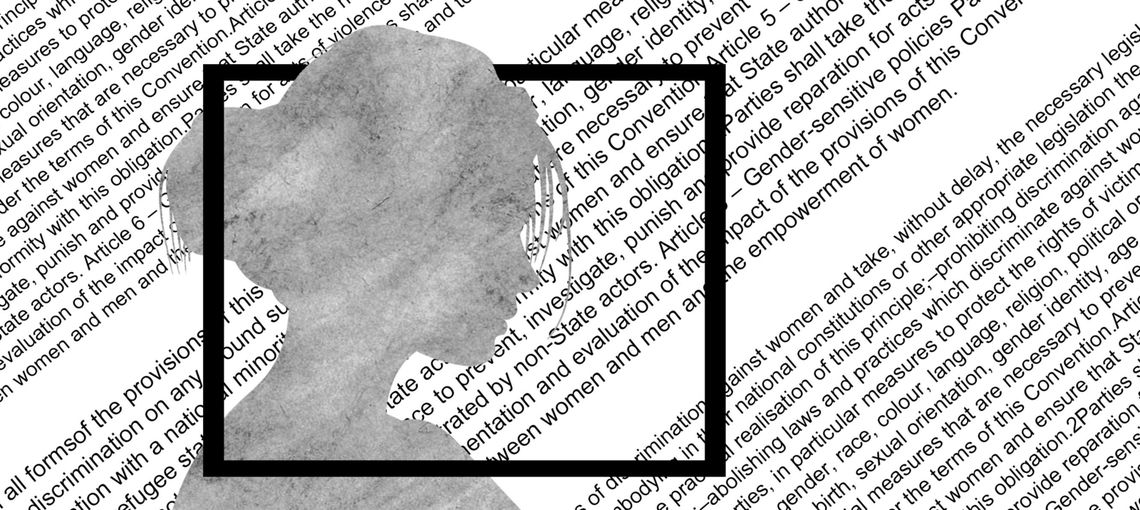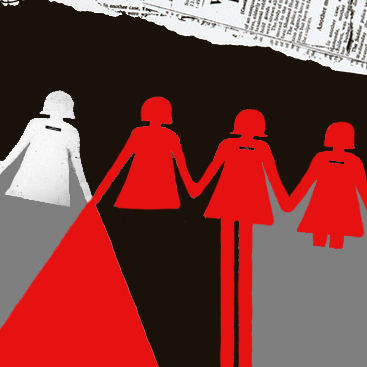Thu Aug 15 2019 · 9 min read
The Istanbul Convention Digested
A Controversy Over Everything It Is Not

By Avnik Melikian

One of the most debated and discussed topics, the Istanbul Convention on Preventing and Combatting Violence Against Women and Domestic Violence, has divided society in Armenia in recent months.
The national outcry over the ratification of the Convention, vehemently (some would argue to the point of fanaticism) opposed by conservatives, and defended by the government and human rights organizations, has created a sense of panic and confusion in Armenia.
The Istanbul Convention is the first international treaty that legally defines violence against women. It focuses solely on violence against women and domestic violence and is an important step towards the protection of women from discrimination and abuse.
While the opposing movement in Armenia, like in many other countries, is uninformed at best and manipulative at worst, there are a set of factors that hint at the probability of political incentives and gains behind the whole anti-Istanbul Convention movement. By announcing their intent to ratify the Convention, the authorities have fallen into the trap of the radical opposition and are getting labeled as promoting perverted values, thus losing legitimacy in a deeply conservative society.
This article will examine whether the ratification of the Convention is timely and will benefit Armenian society if it’s not preceded by institutional reforms and awareness-raising campaigns.
A Quick Examination of the Opposing Movement
Although to outsiders it might seem that this controversy is something new and specific to Armenia, one of the more noteworthy aspects of the opposition movement is that it’s identical to the same ones that took place in Eastern Europe and in other post-Soviet countries. For instance, the same anti-Convention, anti-gender movements have taken place in Latvia, Croatia, and Bulgaria. Those opposing the Convention in Armenia have used the same false arguments used elsewhere:
-
The Convention tries to introduce a “third sex” by differentiating between sex and gender.
Fact: The Convention clearly states that “gender” is the socially constructed roles, behaviours, activities and attributes for women and men - meaning that it recognizes only two sexes.
-
If the Convention is implemented, same-sex marriage will be legalized. It is against the traditional family model.
Fact: The Convention does not impose or suggest what the definition of a “family” should be, leaving it to the signatory countries to define, according to their national legislation. According to Armenian legislation a family is formed through the union of a man and a woman.
-
The treaty is a hidden tool to increase foreign influence and spread “immoral western values.” It contradicts our national traditions and values.
Reality: Is the protection from domestic violence immoral? Are abuse and discrimination towards women or family members our national, traditional values? They are absolutely not, and the 12th-century Armenian scholar Mkhitar Gosh’s “Datastanagirk” (Book of Law) even regulates domestic abuse, and sets fines and divorce in cases of violence against the wife.
“Gender is not a threat, domestic violence is.”
- Angelika Mlinar, member of the European Parliament
The true aims and sources of the opposing movement’s actions are often questionable, suggesting a political agenda or incentives behind it. This is especially evident by the fact that the main leaders of this movement are not grassroot activists or organizations, but generously funded NGOs and individuals. This raises questions about the sources of these funds. For instance, not only did organizers have the funds to print out numerous well-designed and high-quality posters and banners, but also had the money to develop and maintain a website called “NoStambul” just for this issue. This is particularly unlikely for a grassroot organization or movement in a country like Armenia.
Ironically, among the opponents of ratifying the Istanbul Convention are members of the Republican Party, under whose rule the document was initially signed. They officially claim that even though they signed it, they never intended to ratify it.
Taking into consideration that in many of the opposition movements the church is an especially important and active player, it can be deduced that we’re also witnessing a fight for maintaining the status-quo in the power dynamics. Moreover, according to some politicians, this is also a geopolitical power-play for - on the one side Russian, and on the other, Western influence in the country. Having said this, it should be noted again that the text of the Convention is a simple and basic guideline for the protection of fundamental and universal rights of women. It’s the manipulative or uninformed interpretation of the text that gives room for such power plays.
One of the other reasons for the misconceptions and controversy created over the Istanbul Convention is the translation of the name itself: “The Convention on preventing and combating violence against women and domestic violence.” Unfortunately, the Armenian language does not have a direct translation of the word “domestic,” so “domestic violence” has been officially translated into “violence in the family.” This not only touches a sensitive issue in a deeply traditional society - the nuclear family model - and triggers the conservatives, but it also leaves all the other cases of violence in the household, such as violence between domestic partners, between in-law family members and so on, out.
Instead, according to lawyer and expert on international law Ara Ghazaryan, a more accurate translation would be “violence in the household” (կենցաղային or ներտնային բռնություն).
Finally, to better understand the manipulative nature of the arguments put forward by opponents to the Convention, the interview with lawyer and university lecturer Armine Fanyan is quite telling. When asked why she believes the Istanbul Convention has a hidden agenda to promote LGBT rights when there is no mention of that in the Convention, she quotes the official Explanatory Report on the Convention and says that the signatories should understand that victims of domestic violence are also “gay, lesbian and bisexual” people, who “are often excluded from support services because of their sexual orientation. Certain groups of individuals may also experience discrimination on the basis of their gender identity.” Not only is the point she makes misleading, but what she purposfully leaves out is what is clearly stated later on in the report: “Additionally, when ensuring that a gender-sensitive interpretation is given to each of the Convention grounds, Parties may, if they wish, extend the interpretation to individuals who are gay, lesbian, bisexual or transgender.”
Finally, to avoid such parallels, it must be noted that the Constitutional Court of Bulgaria, a country that (according to its own civil society) is ridden with corruption, where the rule of law is at one of the lowest levels in Europe, has decided that the Istanbul Convention is in contradiction with the rule of law in the country.
What is To Be Gained From the Convention?
(Or put simply, the pros)
The Istanbul Convention introduces principles that women’s rights advocates would agree are basic standards for preventing as well as protecting women from further acts of violence. It is merely a set of guidelines and tools aimed at preventing violence, protecting women, prosecuting perpetrators and educating the public to avoid reproducing gender-based stereotypes and discrimination.
-
Cases of physical violence are almost always carried out with psychological and economocic, sometimes also sexual violence. Usually victims hold back from pressing charges, or, even if they do, often they take back those charges due to the psychological pressure they face. The Convention criminalizes all sorts of violence against women.
-
Moreover, as lawyer Ara Ghazaryan says in an interview, he has had a case when the husband tied a rope around the wife’s neck and played with it for 20 minutes, making the woman almost choke to death several times, yet he served only two months in prison and was pardoned. The Convention, he continues, is to ensure that such perpetrators do not qualify for pardon.
-
The Armenian state will also have an obligation to take measures to prevent violence, such as improving the educational system to “include teaching materials on issues such as equality between women and men, non-stereotyped gender roles, mutual respect.”
-
Another tool that the Convention requires is training civil servants, law enforcement so that they are better equipped with the tools and skills to deal with the very sensitive issue of domestic violence. According to Zara Hovhannisyan, this would also create opportunities for the Armenian government to receive more funding from International organizations for fighting against domestic violence.
-
In terms of the already existing national legislation, the law on “Prevention of Violence within the Family, Protection of Victims of Violence within the Family and Restoration of Peace in the Family” that was adopted in 2017 in Armenia, will also need to change. This is especially because the Convention prohibits “mandatory alternative dispute resolution processes, including mediation and conciliation.” The logic behind this provision is that the victim and the perpetrator cannot go back to an equal and healthy relationship. Currently the police and crisis centers in Armenia are engaged in reconciliation process. As Hovhannisyan explains, the Convention requires that the government does not engage in such activities, but if other non-governmental organizations or institutions are created for that purpose, that would be perfectly normal, since it’s not covered by the Convention.
The Istanbul Convention is merely a tool to fight against the many forms of abuse, discrimination and violence women still face in everyday life. It sets out a number of actions to be taken by the government to prevent, protect, prosecute and educate.
Why Not Now?
(Or, the cons)
Simply because a treaty or law is good and just, does not necessarily mean that every society is ready to accept it. It’s like giving junk food to a child for years then suddenly, with no preparation or explanation, start force feeding vegetables. It won’t work. The child should either mature enough to understand, or gradually learn to eat healthy food, slowly, but surely.
In terms of the Convention, that means institutional, revolutionary reforms, awareness raising, and lots of preparation. Without these reforms, this will be yet another signed document on the shelf.
-
This is a sensitive issue for a traditional society. The ratification needs to be preceded by a thorough and carefully prepared awareness raising campaign, educational programs, including social ads. Unfortunately, even though the government has had the ability to implement such campaign through public TV for more than a year, no such projects have been undertaken. Even if now, lawyers and human rights defenders advocate for the Convention on public TV, they cannot connect or resonate with an average citizen - especially considering the mainstream mentality and widespread culture of justifying or simply not recognizing violence.
-
According to Hovhannisyan, this approach of short-cutting to the ratification by the authorities is not honest towards an unprepared society. Even though to feminists it might seem that the right thing to do would be the quick ratification of the Convention, she argues that the feminist approach to the issue of domestic violence would be not introducing the idea of ratification of the Istanbul Convention out of the blue, but increasing the awareness and maturity of society to such a level that it's ready to combat the culture of violence so deeply rooted in our mentality and eradicate it.
-
On a more practical level, to be able to implement the provisions of the Convention (binding for the ratifying states), Armenia needs to have the national toolkit - including amended legislation and reforms in the fields of law enforcement, the judiciary and the educational system, since the aforementioned are currently heavily flawed and inconsistent with the requirements of the Convention. For example, even though the domestic violence law was adopted more than a year ago in Armenia, the cases of violence have not decreased. This is because neither law enforcement nor the judiciary went through a proper reform process or effective training sessions.
-
Finally, it must be noted once again that the Convention is merely a set of guidelines, so in case the government is committed to the cause, it can adopt corresponding national legislation as well as initiate reform processes (including the ones set out in the Convention) without ratifying it beforehand, with the aim of protecting the victims of domestic violence and working on preventing future cases.
Where Does This Leave Us?
As long as a woman finds the courage in herself to file a complaint, but at the police station is told to go home, because that’s her husband and she should be ashamed; as long as a husband beats his wife and the judge thinks that it might be justified; and as long as our television shows and programs reproduce stereotypes, discrimination and abuse, we might as well ratify or sign numerous documents, but they won’t increase the protection of victims of domestic violence.
The Convention is a thorough and reasonable legal document. And in a democratic, not-so-distant future, we will have to ratify it. But at the moment, with all the vital reforms still missing, and the chaos created due to manipulations of the opposing movement playing on the unpreparedness of the population, we may have more urgent tasks at hand, including, and especially, in the field of combating violence.
It should be clarified that the issue of domestic violence is an extremely pressing matter, but ratifying the document - not necessarily.
The path to eradicating violence towards women and domestic violence will, at some point, include the ratification of the Istanbul Convention, but until then, we have so much preparation, education, awareness-raising and reforms to do. It might not be the quickest and easiest way towards our goal, but it will definitely be the smoothest one.
read also:
Domestic Violence: An Imperfect Law and Enduring Stereotypes
By Gohar Abrahamyan
Another case of a woman being killed by her husband has forced Armenian society to speak once again about the one thing it doesn’t like to address - domestic violence.
Broken Destinies: Diary of a Human Rights Defender
By Zara Hovhannisyan
There is no honor in silence. There is no honor when the most vulnerable are subjected to horrifying crimes. Human rights defenders and first responders deal with these cases on a daily basis. Human rights defender Zara Hovhannisyan shares some of her experiences with those whose destinies have been shattered.
Breaking Intergenerational Violence Against Children in Armenia
By Lusine Sargsyan
UNICEF Armenia recently held a conference discussing child abuse in Armenia, a topic that is often not talked about. Based on the Demographic and Health Survey conducted in almost 8000 households in the country, the numbers of children experiencing physical and psychological abuse are quite alarming.
Sexual Discourse: Speaking About the Unspeakable
By Sona Martirosyan
In the public discourse, sex is often seen as being diametrically opposed to almost everything - religion, love, traditional values, even the motherland. With this in mind, many will be shocked to hear that sex does exist in Armenia, Sona Martirosyan writes.
Sex vs. Gender Through Linguistic Expression in Armenian
By Rafik Santrosyan
From referencing the issue of sex-selective abortions to drinking toasts in honor of women, the grammatically genderless Armenian language, still fails to provide a space for its speakers to develop sensitivity towards the intricacies of gender as social conventions and cultural constructs. Rafik Santrosyan, PhD in Linguistics, explains how.
Seeking Perfection
By Aram Hovsepyan
Dr. Aram Hovsepyan examines how people can sometimes fall victim to hidden violence by those closest to them. While this case study is an extreme one that led to implausible results, it highlights the need for education, awareness and most of all, compassion.








